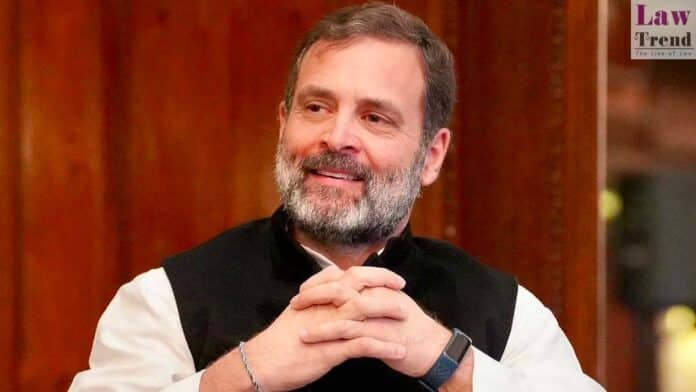The offence for which Congress leader Rahul Gandhi was awarded the maximum sentence of two years in jail was not serious nor did it involve any “moral turpitude”, his lawyer told the Gujarat High Court on Saturday while seeking a stay to his conviction in the 2019 defamation case.
If a bypoll was conducted for the Wayanad constituency which Gandhi represented before he was disqualified, its result can not be undone even if the Congress leader won his appeal against the conviction, said his lawyer Abhishek Singhvi.
After hearing Singhvi’s arguments, the HC adjourned the hearing to May 2 as advocate Nirupam Nanavati, the lawyer of complainant and Bharatiya Janata Party MLA Purnesh Modi, sought time to file a reply.

Justice Hemant Prachchhak of the High Court on Saturday began hearing Gandhi’s revision application against the Surat sessions court April 20 order declining a stay to his conviction for criminal defamation over his `why all thieves have the Modi surname’ remark.
If Gandhi obtains a stay, it would pave the way for his reinstatement as a Lok Sabha MP.
“There are very serious ex-facie vitiating factors of the trial that raise grave apprehension about the process of trial,” advocate Singhvi argued, pointing out that the maximum sentence was awarded for a bailable, non-cognisable offence.
“In the case of a public servant or a legislator, it has very serious additional irreversible consequences – to the person, the constituency, and also drastic consequences of re-election,” he told the court.
If the Election Commission notified a bypoll for Wayanad seat and someone else got elected, then the situation becomes irreversible as this person cannot be unseated even if Gandhi wins his appeal, he said.
If this situation “is not enough to suspend conviction, then what additional circumstances can anybody have?” Singhvi asked.
He also questioned why complainant Purnesh Modi did not challenge Gandhi’s application in the sessions court for a stay to the sentence, but challenged his plea for a stay to the conviction.
He questioned Modi’s “possible interest in Gandhi’s disqualification.”
Gandhi was disqualified under the Representation of the People Act on March 24, a day after the Surat magistrate’s court convicted and sentenced him to two years’ imprisonment for criminal defamation.
Gandhi had not named Purnesh Modi in his speech at the election rally at Kolar in Karnataka on April 13, 2019, where he made the remark in question, Singhvi said.
Under section 499 of the Indian Penal Code (which deals with the offence of defamation), the complainant must be an aggrieved person which was not the case here, he argued.
Also, there is no “identifiable class of Modi community so as to maintain a complaint”, he said, adding that no one from the 13 crore strong so-called community can file a complaint against Gandhi unless that person was specifically named.
In the Navjot Singh Sidhu case cited by the trial court while convicting Gandhi, the respondent had been convicted under section 302 of the IPC but the conviction was suspended, Singhvi pointed out.
“In my case, neither is there a serious case, nor moral turpitude is involved and still conviction is not stayed,” Gandhi’s lawyer said.
There were as many as six serious errors vitiating the trial, Singhvi said.
He also pointed out that the Supreme Court’s order admonishing Rahul Gandhi and asking him to remain careful in future over his Rafale case remark, which the trial court cited, came on November 14, 2019, while Gandhi’s speech in the present case was made seven months earlier, on April 13, 2019.
“There is no question of being retrospectively careful. The learned judge misdirects himself,” Singhvi said.
Purnesh Modi did not attend the rally at which Gandhi made his controversial remark, and his complaint was based on a WhatsApp message which gave an account of the speech, the lawyer said.
“What better case can there be for getting a stay of conviction when the consequences of non stay of conviction are so drastic and irreversible by their very nature….If I (Gandhi) don’t get the conviction stayed, I am otherwise debarred from contesting for a period of eight years,” he said.
Opposing the plea, public prosecutor Mitesh Amin said this was not the stage to “agitate the aspect of quantum of sentence.”
“This is a stage where the court may certainly look into very peripheral aspect of seriousness of offence, but learned magistrate as well as the learned sessions judge had come to the conclusion appreciating the material of investigation that it is a serious offence in terms of the acts committed by the petitioner,” he told the court.
Also Read
“Therefore, this is not a case where the honourable court may exercise the discretion of staying the conviction,” the prosecutor added.
Advocate Nanavati, Purnesh Modi’s lawyer, contended that Gandhi’s petition was not maintainable, and his client should be allowed to file a reply.
The court allowed the request, keeping the matter for further hearing on the afternoon of May 2.
The Surat magistrate’s court on March 23 sentenced Rahul Gandhi to two years in jail after convicting him under sections 499 and 500 of the Indian Penal Code for criminal defamation.
Purnesh Modi, a former Gujarat minister, filed a criminal defamation case against Gandhi over the latter’s ‘How come all thieves have Modi as the common surname?’ remark made during an election rally at Kolar in Karnataka ahead of the 2019 Lok Sabha polls.
On April 3, Gandhi moved the sessions court seeking bail and a stay to the conviction pending his appeal.
The court granted Gandhi bail but refused to stay the conviction, following which he moved the High Court.
On Wednesday, Justice Gita Gopi of the HC recused herself from hearing. The matter was then reassigned to Justice Prachchhak.







